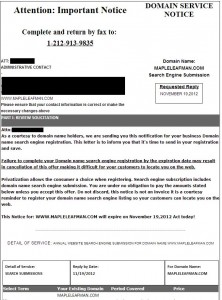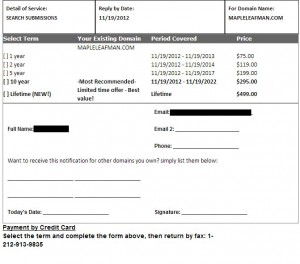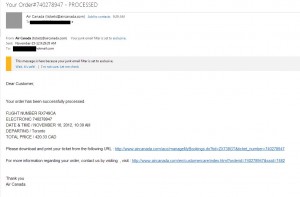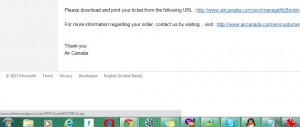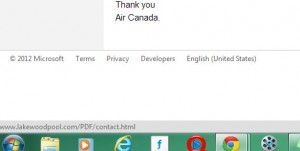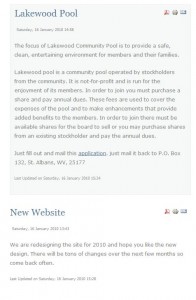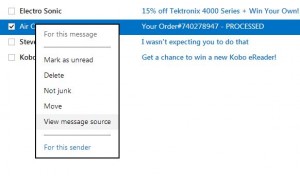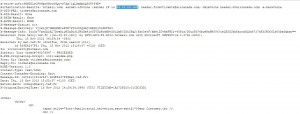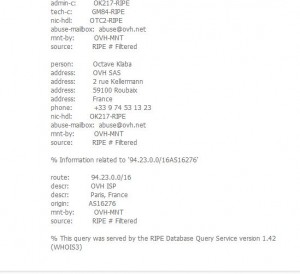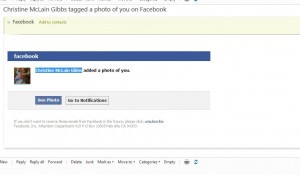We don’t often get into the nuts and bolts of ad campaigns here on Computers Made Simple but this time we’re making an exception. Here’s how you can avoid this kind of misleading advertising when you’re looking to pick up some new piece of technology. Better yet, stop buying from the companies who use these techniques. Speak with your wallet.
1. We subscribe to an email flyer from HP (Hewlett Packard), vendors of everything from laptops to printers and everything in between. We’ve got quite a few bits and pieces of their technology, including at least three laptops. Here’s the email flyer we received yesterday morning:

The first thing we noticed was the price, $349.99. HP Notebooks starting at $349.99. Notice the asterisk? Here’s the fine print for it:
* Offer good while supplies last, and subject to change or cancellation at any time. See product page for details. Prices shown may include applicable instant savings. Restrictions apply to sale items and are subject to change without notice. Offer valid on HP clearance notebooks and desktops July 8, 2013 through July 22, 2013.
Please note the dates of the sale, July 8th to July 22nd. That’s quite a period of time, isn’t it? 14 days, two weeks, lots of time for this sale, that’s for sure.
2. Here’s what we saw when we click on the ad:

Where is the laptop selling for $349.99? Unfortunately, it doesn’t seem to exist. Next cheapest is $399.99, fifty bucks more than the advertised price. What’s going on here?
3. We Tweeted HP Support on this:

4. After some back and forth with HPSupport on Twitter, we decided to engage the HP Live Chat feature on the HP site. Here’s the conversation (a long read but useful if you’re ever thinking of using Live Chat with a product rep):
Start: __________
Welcome to the HP Shopping Canada Chat Service.
You are connected with HP Shopping Canada Chat Service. My name is ‘Peter’. How may I help you today?
Peter: Hi!
you: I received the Summer Stock Blowout email. It mentions notebooks starting at $349
you: I click on the email and see nothing at $349, cheapest on the page is $399
you: what’s up with that?
Peter: I appreciate your interest in HP!!
Peter: let me check on that, just a moment please..
you: ok
Peter: Thanks for being online.
Peter: Please have a look at HP Pavilion Chromebook 14-c010us Notebook PC – D1A48UA. It cost around $ 329.99
Peter: HP Pavilion Chromebook 14-c010us Notebook PC – Click here
you: I know, I found some at $299 but I am not looking for a Chromebook. The email said ‘notebook’ and $349 with a link to a page. That page did not have anything at $349, cheapest was $399. Something’s not right about that, in my opinion.
you: If it is a Chromebook, you should specify that.
you: Chromebooks are very limited, your notebooks aren’t.
Peter: One moment please..
Peter: Thanks for being online.
Peter: I have double checked on this, HP 2000-2c20ca Notebook PC is cheapest(cost) notebook model cost around $ 399
Peter: HP 2000-2c20ca Notebook PC – Click here
you: the one show on the linked page is the same price and it has 6GB of ram and a better processor.
you: http://h20386.www2.hp.com/CanadaStore/Merch/Product.aspx?sel=PCNB&id=C2N57UA&opt=ABL&p=clearance-sale
you: but it is 399 not 349 as the email suggested
Peter: Do you received any promo code in that e-mail?
you: and it’s on clearance, the one you described is regular price
you: there is no promo code in the email. “Scorching deals on notebooks’
you: it’s titled Summer stock blowout
you: I can’t copy and paste into this, can I?
Peter: No, you can’t..
you: should I email it back to you?
you: (Hewlett-Packard@canada.newsgram.hp.com
you: that’s who it’s from
you: that’s you, isn’t it?
you: there is a monitor code but I don’t need a monitor
you: MONITOR25 is that code
Peter: Please hold on..
Peter: Scorching deals on Notebooks for HP Pavilion g6-2240ca Notebook PC is $ 399 only not $349. It’s original cost is $ 469.99 and 15% discount for the product.
Peter: http://h20386.www2.hp.com/CanadaStore/Merch/Show.aspx?p=clearance-sale&jumpid=re_r11391_ca/en/hpshopping/clearance_sale_banner/20130708
you: I know that. I have already told you that.
you: There is NO notebook for $349, that’s what I’m trying to tell you.
you: the email says $349 but there is nothing at that price. The cheapest on the linked page is $399
you: maybe I’m not making myself clear here.
Peter: One moment please..
Peter: For that, let me help you with the direct contact information of our dedicated experts who can confirm you on your mail discount details.
Peter: Our dedicated sales team experts can be reached at 1-877-231-4351.
you: So you are saying that you don’t believe the price in the email? You are suggesting that I am not being honest?
Peter: No, I can able to assist you with the online details only..
End ________________________
Ummmm, weren’t we asking about the online details? Hello! You’ll note that Peter dodged the question completely, offering a Chromebook that was not on sale and, in our opinion, is not a ‘notebook’. Chromebooks are locked into Google, have very small SSD drives and only work when you are online, making them useless when you travel. They are no better than a tablet or a smartphone, for us anyway.
5. At this point we decided to call the number that we were given. After a short wait, Ken came on and reported that the $349.99 computers had been sold out, there were none left. We asked if there would be any consideration on the $399.99 laptop that was now the least expensive on there. Ken explained that the price was fixed and there would be no further reduction.
6. The point of all of this is that the sale runs for two weeks. We clicked on the ad very early in the morning of July 8th. How is it possible that the highlighted laptop could be sold out in a matter of minutes. Honestly, $349.99 is not an earth-shattering price. We’ve seen perfectly good laptops for $249.99 at other online retail sites. To us, this is an obvious ‘bait and switch’ attempt by HP, advertising a low price but switching us to a more expensive model. In most countries this type of advertising is illegal. Other retailers that we use keep the sold out items on their sites, simply to avoid this kind of situation.
Update:
This morning, July 9th, HP has updated their site. Instead of offering a replacement for the $349.99 laptop, they put the sold out one back on the list. Check the red availability icon:

Now, the question we have is this: Did HP put the cheap laptop back because of the storm that we raised or did other consumers ask the same questions?
HP is a Fortune 500 company. They make decent laptops, desktops, printers and scanners plus a host of other technology. As far as running online ads, however, they seem no better than a Ma and Pa one store shop, putting up ads to get sales using an obvious, and illegal, bait and switch technique. Truly, this is a caveat emptor case if we’ve ever seen one.
Thanks for reading! Think very carefully about doing business with HP in the future. Their technology is decent but their online store isn’t. If you decide to support HP by buying one of their products, buy it somewhere else. In Canada, we highly recommend Future Shop.

